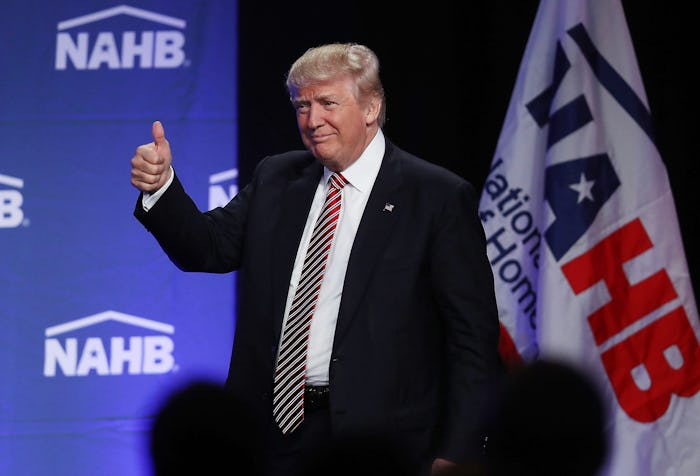News

Donald Trump Calls Himself Mr. Brexit For No Apparent Reason, Confuses Everyone
We've got "Crooked Hillary," "Lyin' Ted," and "Little Marco." Now, add "Mr. Brexit" to the list. In one of his most idiosyncratic tweets of this election cycle, Donald Trump called himself Mr. Brexit for no apparent reason. "They will soon be calling me MR. BREXIT!" he tweeted out early on Thursday morning, causing his new self-appointed title to become a Twitter trending topic. This odd assertion is causing voters everywhere to try and dissect what exactly he means.
Trump supported Britain's withdrawal from the European Union earlier this summer. Before the vote, he told London's Sunday Times that he sided with Brexiters "for a lot of reasons like having a lot less bureaucracy." It's possible that Trump identifies with Brexit due to the referendum's massive turnaround in the few months leading up to the vote. A motion that once held high disapproval ratings was later passed, which, given Trump's highly unfavorable ratings, could be his only hope for winning the presidency.
In current polls, Hillary Clinton is showing significant leads over Trump. In an interview with The New York Times before the RNC, Trump hoped to gain a stable lead over Clinton, specifically in battleground states, saying: “It’ll happen after the conventions... believe me.” If anything, the results have been the polar opposite.
Though this is the first time he's tweeted it, Trump has actually called himself "Mr. Brexit" before. In a previous Fox News interview, he projected his own faith in his presidential campaign, saying: "I see a result coming and I know that if I can get to that position we're going to turn this country around so fast." He then referred to Bill O'Reilly and Sean Hannity's support of his presidential run, saying that the two have referred to Trump's campaign as "the single greatest phenomenon that [they've] seen as...politician[s]."
The interviewer continued: "The country's changing, the world's changing, we saw Brexit and now we're seeing this in the United States," to which Trump added, "Well, I think I will be called Mr. Brexit."
It appears that this association has little to do with the actual policy or effects derived from Brexit, but instead alludes to more general trends, such as the idea of national "freedom" and a resistance to transnational ties. Regardless of its intent, whether it be as a self-manifestation to defy expectations or as a way to highlight his ability to engender change, Trump's remarks have confused voters more than anything else, ultimately offering new opportunities to make make pointed jabs at the candidate.